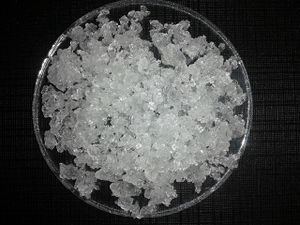Difference between revisions of "Aluminium nitrate"
(→Preparation) |
|||
| Line 8: | Line 8: | ||
===Physical=== | ===Physical=== | ||
| − | Aluminium nitrate is an odorless, white crystalline hygroscopic salt. It has good solubility in water (73.9 g/100ml at 20 °C), but is poorly soluble in alcohols and ethylene glycol. It melts at 66 °C (anhydrous) and 73.9 °C (nonahydrate), and if heated higher the nonahydrate will decompose. | + | Aluminium nitrate is an odorless, white crystalline hygroscopic salt. It has good solubility in water (73.9 g/100ml at 20 °C), but is poorly soluble in alcohols and [[ethylene glycol]]. It melts at 66 °C (anhydrous) and 73.9 °C (nonahydrate), and if heated higher the nonahydrate will decompose. |
==Availability== | ==Availability== | ||
| − | Aluminium nitrate is sold by chemical suppliers. | + | Aluminium nitrate is sold by chemical suppliers. It can sometimes be found on eBay. |
==Preparation== | ==Preparation== | ||
Revision as of 18:54, 14 January 2016
Aluminium nitrate is a salt of aluminium and nitric acid, existing normally as a crystalline nonahydrate, Al(NO3)3·9H2O.
Contents
Properties
Chemical
Aluminium nitrate reacts with sodium hydroxide, precipitating aluminium hydroxide:
- Al(NO3)3 + 3NaOH → Al(OH)3 + 3NaNO3
Physical
Aluminium nitrate is an odorless, white crystalline hygroscopic salt. It has good solubility in water (73.9 g/100ml at 20 °C), but is poorly soluble in alcohols and ethylene glycol. It melts at 66 °C (anhydrous) and 73.9 °C (nonahydrate), and if heated higher the nonahydrate will decompose.
Availability
Aluminium nitrate is sold by chemical suppliers. It can sometimes be found on eBay.
Preparation
Aluminium nitrate cannot be made by adding aluminium to nitric acid, as the aluminium forms a passivation layer which prevents the reaction from taking place. One way around it is to add nitric acid to another compound of aluminium, such as aluminium chloride, reaction which gives off nitrosyl chloride fumes.[1]
If you want to avoid the fumes, use aluminium hydroxide as a precursor chemical. This reaction however will yield the hydrated form.
Projects
- Make alumina nanoparticles[2]
Handling
Safety
Aluminium compounds are toxic and should be handled with care.
Storage
The anhydrous form must be stored in airtight containers, while the nonahydrate should be stored away from moisture.
Disposal
Adding a hydroxide or any other base will neutralize the compound.
References
- ↑ https://www.youtube.com/watch?v=u4Ha1SJrazY
- ↑ http://nopr.niscair.res.in/bitstream/123456789/28846/1/IJPAP%2052%286%29%20378-385.pdf
